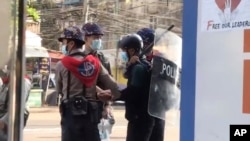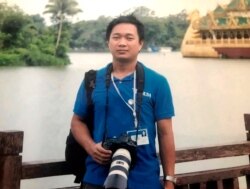Myanmar’s military has imposed martial law in its latest move to suppress widespread protests over the February 1 coup, with journalists warning of continued media suppression.
Dozens of protesters were killed Sunday in the deadliest day so far since the military overthrew the civilian government over unproven claims of election fraud and arrested senior leaders of the National League for Democracy party, including Aung San Suu Kyi.
The military has used force and arrests to try to end protests, suspended licenses for at least five news networks and imposed nightly internet blackouts. Over 2,000 people have been arrested, and 126 killed, according to the Thailand-based non-profit the Assistance Association for Political Prisoners Burma (AAPPB).
Journalists in Myanmar are finding themselves increasingly targeted by the country’s armed forces, with at least 38 detained in recent weeks, the AAPPB says. Several said they have changed how they cover the unrest to avoid arrest or worse.
Win Zaw Naing, an editor for the independent news website Red News Agency, told VOA, “Journalists are now being targeted, arrested and sued” and that reporters have to run and hide from the military, just like protesters.
“Our concern is not to be arrested and imprisoned. Our biggest concern right now is they violently beat to death during arrest,” he said.
The editor said he was arrested on March 8 while covering a group of civilians who had detained a soldier in Yangon.
“The army came and tried to rescue their man, and did (a) violent raid. I was handed over to the police to take necessary action because I am a journalist," he said.
Win Zaw Naing said he spent one night in the police station, where authorities asked for his details and checked his camera and phone.
The journalist had not published his report, and his colleagues briefly deactivated the Red News Agency Facebook account. The military last month ordered mobile operators and internet service providers to block Facebook, Instagram and Twitter.
Win Zaw Naing was later released, but police confiscated two phones, a camera and a wallet.
The editor insists that despite the risks, the reporting methods used by his news agency have not changed.
“We don’t change our writing news format. We don’t change our usage, we continue to do the right things, we are reporting the news, covering the news with media ethics,” he added.
Win Zaw Naing was released but several, including an Associated Press (AP) journalist arrested at the end of February, remain in custody.
Thein Zaw, who was arrested with several other members of the media, is being held on charges of “violating a public order law.” The AP journalist’s remand has been extended until March 24, when he faces a court hearing.
Local media reports say Polish photojournalist Robert Bociaga was also beaten and arrested last week. Bociaga, a freelancer for German news agency Deutsche Presse-Agentur (DPA), was detained while covering demonstrations.
Myanmar’s military has denied media freedom is under threat.
The head of the State Administrative Council press team and spokesman for the army, Brigadier General Zaw Min Tun, said at a March 11 news conference that the military “respects and values media freedom” and has only arrested journalists who were inciting unrest.
Under threat
A freelance journalist in Yangon, who asked to remain anonymous to protect his identity, said he has resorted to staying indoors after security officials confronted him.
“At the time, the security force pointed his gun at me and said, ‘I don’t want to shoot you, go back,’” the journalist told VOA. “As a freelance journalist, no one guarantees for me if I get arrested or injured or something happens in a negative way in the front line.”
Fears have been amplified for journalists and protesters alike with reports of regular night-time raids by soldiers.
Alongside night curfews still in place because of the COVID-19 pandemic, the junta has imposed nightly internet shutdowns for weeks, in what it says are efforts to ensure the country’s “stability.”
Internet and social media platforms like Facebook are a key source of information in Myanmar. Residents have had to resort to using scarcely available WIFI to stay online or connecting via Virtual Private Network (VPN) or by using sim cards from neighboring Thailand.
News outlets covering the unrest are also being targeted with legal action and raids.
Five media companies had licenses revoked, three of which are VOA affiliates. Myanmar Now reported that armed men who arrived in military trucks raided its office in Yangon on March 8. And independent media outlet The Irrawaddy, reported that the company faces a lawsuit from the military over allegations of “disregarding” armed forces in its coverage.
Another local journalist, who also asked to stay anonymous, told VOA the country’s freedom of the press is at stake.
“I am very concerned now that the freedom of press will vanish within a few months,” he said.
The journalist, currently in Yangon, admitted he “keeps a low profile” and has had to change his reporting tactics.
“I put on a full uniform, (a) press helmet and vest. But after the crackdowns on journalists, we disguise as protesters and citizens to stay inside the crowd. Sometimes, due to our camera, we are targeted as a spy by the police,” he said.






